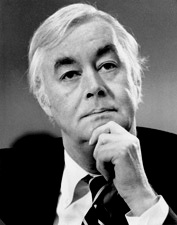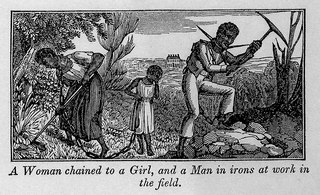
The Emancipation Proclamation, officially Proclamation 95, was a presidential proclamation and executive order issued by United States President Abraham Lincoln on January 1, 1863, during the Civil War. The Proclamation changed the legal status of more than 3.5 million enslaved African Americans in the secessionist Confederate states from enslaved to free. As soon as slaves escaped the control of their enslavers, either by fleeing to Union lines or through the advance of federal troops, they were permanently free. In addition, the Proclamation allowed for former slaves to "be received into the armed service of the United States."

Daniel Patrick Moynihan was an American politician, diplomat and sociologist. A member of the Democratic Party, he represented New York in the United States Senate from 1977 until 2001 and served as an adviser to Republican President Richard Nixon.

The legal institution of human chattel slavery, comprising the enslavement primarily of Africans and African Americans, was prevalent in the United States of America from its founding in 1776 until 1865, predominantly in the South. Slavery was established throughout European colonization in the Americas. From 1526, during early colonial days, it was practiced in what became Britain's colonies, including the Thirteen Colonies that formed the United States. Under the law, an enslaved person was treated as property that could be bought, sold, or given away. Slavery lasted in about half of U.S. states until abolition. In the decades after the end of Reconstruction, many of slavery's economic and social functions were continued through segregation, sharecropping, and convict leasing.

Henry Steele Commager (1902–1998) was an American historian. As one of the most active and prolific liberal intellectuals of his time, with 40 books and 700 essays and reviews, he helped define modern liberalism in the United States.

African-American history began with the arrival of Africans to North America in the 16th and 17th centuries. Former Spanish slaves who had been freed by Francis Drake arrived aboard the Golden Hind at New Albion in California in 1579. The European colonization of the Americas, and the resulting transatlantic slave trade, led to a large-scale transportation of enslaved Africans across the Atlantic; of the roughly 10–12 million Africans who were sold by the Barbary slave trade, either to European slavery or to servitude in the Americas, approximately 388,000 landed in North America. After arriving in various European colonies in North America, the enslaved Africans were sold to white colonists, primarily to work on cash crop plantations. A group of enslaved Africans arrived in the English colony of Virginia in 1619, marking the beginning of slavery in the colonial history of the United States; by 1776, roughly 20% of the British North American population was of African descent, both free and enslaved.
The Negro Family: The Case For National Action, commonly known as the Moynihan Report, was a 1965 report on black poverty in the United States written by Daniel Patrick Moynihan, an American scholar serving as Assistant Secretary of Labor under President Lyndon B. Johnson and later to become a US Senator. Moynihan argued that the rise in black single-mother families was caused not by a lack of jobs, but by a destructive vein in ghetto culture, which could be traced to slavery times and continued discrimination in the American South under Jim Crow.

Eric Foner is an American historian. He writes extensively on American political history, the history of freedom, the early history of the Republican Party, African American biography, the American Civil War, Reconstruction, and historiography, and has been a member of the faculty at the Columbia University Department of History since 1982. He is the author of several popular textbooks. According to the Open Syllabus Project, Foner is the most frequently cited author on college syllabi for history courses.

Stanley Maurice Elkins was an American historian, best known for his unique and controversial comparison of slavery in the United States to Nazi concentration camps, and for his collaborations with Eric McKitrick regarding the early American Republic. They together wrote The Age of Federalism, on the history of the founding fathers of America. He obtained his BA from Harvard University and his Ph.D. in history from Columbia University. Elkins first taught at the University of Chicago but spent most of his career as a professor of history at Smith College in Northampton, MA, where he raised his family and eventually retired.

Slavery in Sudan began in ancient times, and recently had a resurgence during the Second Sudanese Civil War (1983–2005). During the Trans-Saharan slave trade, many Nilotic peoples from the lower Nile Valley were purchased as slaves and brought to work elsewhere in North Africa and the Orient by Nubians, Egyptians, Berbers and Arabs.

Andrew Peter Napolitano is an American syndicated columnist whose work appears in numerous publications, including The Washington Times and Reason. He was an analyst for Fox News, commenting on legal news and trials. Napolitano served as a New Jersey Superior Court judge from 1987 to 1995. He was a visiting professor at Brooklyn Law School. He has written nine books on legal and political subjects. During his twenty-four-year tenure as Fox News' Senior Judicial Analyst, Napolitano appeared more than 14,500 times on air, a record for any on-air personality at the network.
Eugene Dominic Genovese was an American historian of the American South and American slavery. He was noted for bringing a Marxist perspective to the study of power, class and relations between planters and slaves in the South. His book Roll, Jordan, Roll: The World the Slaves Made won the Bancroft Prize. He later abandoned the left and Marxism and embraced traditionalist conservatism.
Ulrich Bonnell Phillips was an American historian who largely defined the field of the social and economic studies of the history of the Antebellum South and slavery in the U.S. Phillips concentrated on the large plantations that dominated the Southern economy, and he did not investigate the numerous small farmers who held few slaves. He concluded that plantation slavery produced great wealth, but was a dead end, economically, that left the South bypassed by the industrial revolution underway in the North.
Steven Howard Hahn is Professor of History at New York University.
Time on the Cross: The Economics of American Negro Slavery (1974) is a book by the economists Robert Fogel and Stanley L. Engerman. Fogel and Engerman argued that slavery was an economically rational institution and that the economic exploitation of slaves was not as catastrophic as presumed, because there were financial incentives for slaveholders to maintain a basic level of material support for those they held as property. The book was reprinted in 1995 at its twentieth anniversary. The book contradicts the long-standing notion that slavery was economically backwards, underdeveloped the South, and was on the path to extinction before the Civil War broke out. It attracted widespread attention in the media and generated heated controversy and criticism for its methodology and conclusions.
Herbert George Gutman (1928–1985) was an American professor of history at the Graduate Center of the City University of New York, where he wrote on slavery and labor history.

The institution of slavery in North America existed from the earliest years of the colonial history of the United States until 1865 when the Thirteenth Amendment permanently abolished slavery throughout the entire United States. It was also abolished among the sovereign Indian tribes in Indian Territory by new peace treaties which the US required after the Civil War.

The Slave Community: Plantation Life in the Antebellum South is a book written by American historian John W. Blassingame. Published in 1972, it is one of the first historical studies of slavery in the United States to be presented from the perspective of the enslaved. The Slave Community contradicted those historians who had interpreted history to suggest that African-American slaves were docile and submissive "Sambos" who enjoyed the benefits of a paternalistic master–slave relationship on southern plantations. Using psychology, Blassingame analyzes fugitive slave narratives published in the 19th century to conclude that an independent culture developed among the enslaved and that there were a variety of personality types exhibited by slaves.
Thomas Jefferson, the third president of the United States, owned more than 600 slaves during his adult life. Jefferson freed two slaves while he lived, and five others were freed after his death, including two of his children from his relationship with his slave Sally Hemings. His other two children with Hemings were allowed to escape without pursuit. After his death, the rest of the slaves were sold to pay off his estate's debts.
Michael Kazin is an American historian, and professor at Georgetown University. He is co-editor of Dissent magazine.

Marriage of enslaved people in the United States was generally not legal prior to the Civil War (1861–1865). Enslaved African Americans were considered chattel legally, and they were denied human or civil rights until slavery was abolished after the Civil War and with the passage of the Thirteenth Amendment to the Constitution of the United States. Both state and federal laws denied, or rarely defined, rights for enslaved people.










